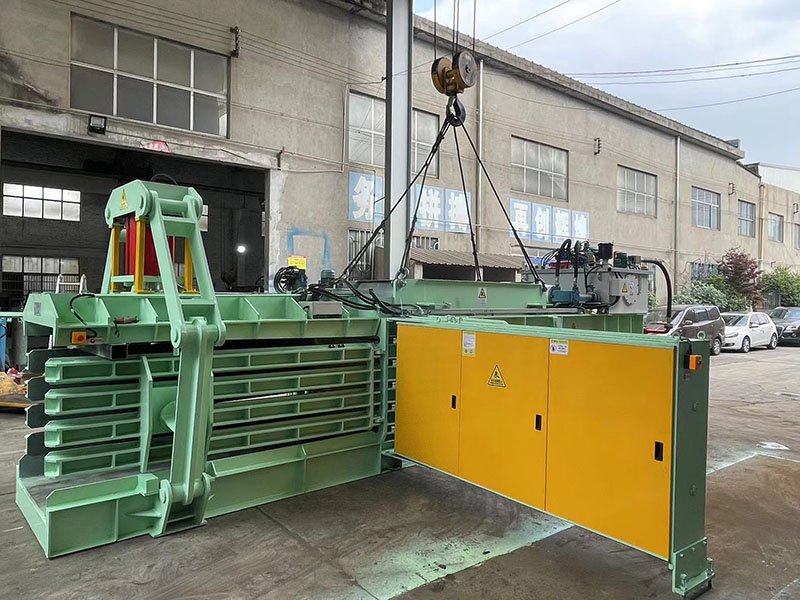Western Resources Group of Ogallala produces eco-shred bedding from 100% recycled, high-quality cardboard.
Livestock producers can now purchase environmentally friendly livestock bedding that is more absorbent than straw and wood shavings. Kurtis Olson, plant manager of Western Resources Group (WRG) in Ogallala, says this eco-shred bedding is made from 100% recycled, high-quality cardboard. Vertical Cardboard Baler

BALES OF BEDDING: WRG offers bales of shredded cardboard livestock bedding. This eco-shred bedding is made from 100% recycled, high-quality cardboard. Most of these bales weigh about 50 pounds, but bulk bales that weigh 1,200 pounds can also be made.
The goal of this project is to maintain a green concept, create jobs at a local level and keep these materials out of the landfill. "We are environmentally conscious, but not to the detriment of sound economic principles," Olson says. "WRG was looking for something that wouldn't cost a lot to get started, and utilize a product we were already collecting. The board of directors decided to go with the corrugated cardboard shredded bedding concept. Cardboard remains a constant, renewable recycling staple in most communities nationwide," he explains.
Most of the bales weigh about 50 pounds, but we can also make bulk bales that are 1,200 pounds," Olson says. Loose bedding is also available in bulk.
During the shredding process, drum magnets are attached to the conveyor systems, which remove 99.9% of any metallic material attached to the cardboard on the first conveyor. The redundant second conveyor will catch and remove any staples that may get missed by the primary system.
POPULAR ALTERNATIVE: Shredded cardboard moves up a conveyer into a baler. The eco-shred bedding is gaining popularity with livestock producers, horse owners, kennels and poultry farms. Olson says the eco-shred bedding is comparable in cost to wood shavings and sawdust.
The eco-shred bedding is gaining popularity with livestock producers, horse owners, kennels and poultry farms. Olson says these producers have found shredded cardboard bedding to be three times more absorbent than wood shavings and healthier for their animals. "A lot of trees are diseased that are shredded for sawdust or wood shavings," Olson explains. "Those products could have fungal spores, beetles and fecal material from squirrels, raccoons, possums and birds. We actually provide a line of cardboard bedding to veterinarians for post-surgery that is not sterile by laboratory standards, but it is a lot cleaner product because it doesn't have bird droppings and other contaminates that are found in forestry products."
Shredded cardboard bedding also has some outstanding thermal insulation qualities. "It keeps animals really warm, and it is virtually odor-free. Customers can request a pine scent additive that helps cut down the ammonia smell during the winter months, when the animals are kept inside more," he explains.
Olson says it is also ideal for customers with allergies. Some people allergic to cedar or pine shavings stay away from livestock auctions. But with the shredded cardboard, they don't have a problem. The product also has minimal dust, thanks to a vacuum system that captures and extracts a fair amount of it during the shredding process, he says.
Some horse owners who haul their horses like the product, Olson says. "Horse owners and sale barns are our biggest customers right now. Horse owners like it, because when they are trailering their horses, a lot of the wood shavings get airborne and end up caught in the horse's mane and tail. The shredded cardboard doesn't do that, which means it is also safer for the horse's lungs. Horses and other animals can get the equivalent of COPD [chronic obstructive pulmonary disease], and can develop lung conditions. Some customers have switched to shredded cardboard bedding because of that," he notes.
Livestock producers are also showing interest in the product, which Olson says is comparable in cost to wood shavings and sawdust. Some customers buy it for their egg-laying hens because they don't scratch it all out of the nesting box, like they do wood shavings. Olson says these customers say the hens like the shredded cardboard better because it isn't prickly or scratchy. "It will also last a third longer than wood shavings because it is so absorbent."
The durability of the cardboard bedding depends upon the size of area and number of animals, Olson explains. "It lasts longer than wood shavings because the cardboard will absorb urine rather than displacing it like wood shavings. In low humidity areas, the cardboard bedding will also allow some of the moisture to evaporate."
The used bedding can be disposed of like sawdust or wood shavings. "It is much more user-friendly and breaks down quicker than wood shavings, especially cedar," Olson noted. "Shredded cardboard can also be applied to a garden or a field. It can be used as compost, and makes an excellent soil builder or fertilizer because it doesn't alter the pH of the soil like wood shavings."
Enter a zip code to see the weather conditions for a different location.
Raised in Rice: rice brand a family legacy
Keep cattle cool, comfortable this summer
Combat red sunflower seed weevil
Does your selection and mating program create profit potential?
Farm Progress receives journalism award
Idaho gets $11m to study women’s nutrition

RDF Balers Copyright © 2024. All rights reserved. Informa Markets, a trading division of Informa PLC.